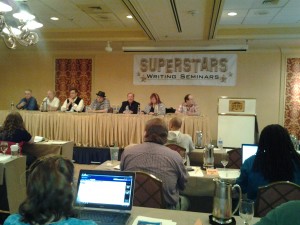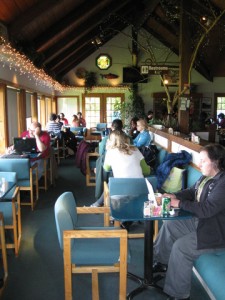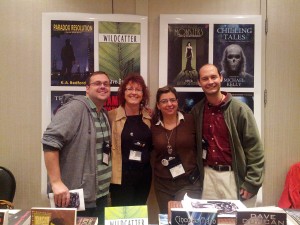I’ll admit, my track record with attending the World Fantasy Convention (WFC) is a bit spotty. I usually end up going every other year. My last was in 2011 in San Diego, so this year is my year to go again, and I’m finding myself quite jazzed about that.
As a writer, I’ve got a few books that will definitely be in shape to be pitched, and I’ll hopefully already be submitting those, so I’ll actually have a few things to talk about with people. In the past, I haven’t been as aggressive at conventions as I should be. It’s one of my goals to fix that this year, and WFC always pulls in great authors, publishers, editors and agents focusing on speculative fiction. It’s a great place to network with people in the industry. Since it’s got a membership cap, it’s pretty easy to rub elbows with the right people. This is a working convention rather than a fan one, so it’s a good place to start for those of us who want to break into the business and get advice from professionals.
As with any convention, there are panels running pretty non-stop and parties for socializing and networking. And of course, if you’re really interested in getting some business done, one must spend quality time at the bar.
As a reader, WFC has always been a great place to find new books to read–more than any other convention I go to. The dealer’s room can burn a whole in anyone’s pocket especially with the number of writers running around, there’s no problem finding signed copies of things or hard to find items. Or you can bring your own books for the evening where all the writers show up for one mass signing event. I’ve learned to leave extra room in my suitcase because I always come home with a huge stack of new books. Heck, you usually get a bag full of books when you arrive just for showing up.
Okay, I’ll confess that part of my enthusiasm in wanting to attend WFC this year is the location. I’ve always wanted to go to the UK, and here’s a great excuse.
Of course, this means I’ll have to put in a little extra effort–a bit more planning–than when WFC is held in North America. Frankly, this trip is gonna get expensive fast. Flights alone from the US right now are over $1000. That’s more than I usually spend on the entire trip to this convention. And, come on, what’s the point to going to England just for one three day convention? Might as well stick around for a few days extra to at least visit London, which is about an hour away.
Wanna come, too?
First, check out the website here.
Membership costs 125£, roughly about $200. With the membership cap, it’s a good idea to register early. Make sure you fill out the registration form as well as make your payment because you have to have both to be registered for attendance. While they claim that refunds are at the “discretion of the convention”, they usually don’t do refunds, but you can transfer your membership to someone else should you not be able to attend after all.
The host hotel, the Hilton Brighton Metropole, sold out in less than 24 hours after reservations went online. The convention is working to find overflow hotels but hasn’t posted anything yet, though they have put up a link for finding other accommodations.
The WFC 2013 homepage has a list of publishers attending, and there’s a list of currently registered members so it’s always a great idea to look both over and plan out who you might want to meet.
If you want to keep up with what’s going on, they now have an app for that for both iPhone and Android users.
If you’re like me and live in the US, there’s also the host of logistics to plan for: passports, electrical adaptors, making sure your phone works in another country, all those little things that are easy to forget when you’re going out of the country. Seriously, it’s a lot of work to go from one place to another.
So, have you gone to WFC in the past or plan to go this year? Leave a comment and let us know what you’ve enjoyed in the past and/or look forward to.




